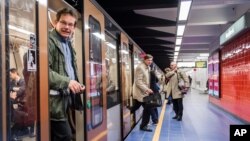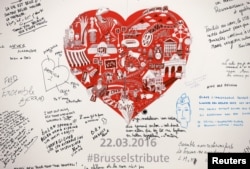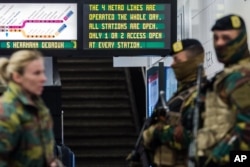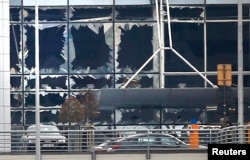Commuters poured out of the newly reopened Brussels Maelbeek metro station Monday, in a fresh sign the city was returning to normal a month after the terrorist attacks — despite a struggling tourism industry and simmering criticism over the government’s fractured response to the crisis.
Commuters drew pictures and jotted a few lines on a newly erected memory wall, reflecting their views and testimony regarding the March 22 suicide bombings at the Brussels airport and metro that killed 32 people, including 16 at Maelbeek.
“That morning in the metro I witnessed and saw indescribable horror,” one person wrote in words carried by Belgian news agencies. “And despite that dramatic situation, I have experienced the solidarity of those most affected.”
“All together!” another commuter wrote.
As of Monday, the city’s subway schedules were back to normal, after weeks of shortened service. Brussels’ Zaventem airport, where suicide bombers struck about an hour before the Maelbeek morning rush hour bombing, had also partially reopened, with plans for it to be fully operational in July.
Financial costs
Yet few dispute the city, especially its tourism sector, has taken a hit. Hotel and restaurant business in central Brussels plummeted by up to 40 percent, and 10,000 jobs risk being lost, according to the Brussels Chamber of Commerce, citing a mix of factors beyond the attacks that also include closed tunnels and a new pedestrian section limiting traffic access.
But the chamber’s CEO Olivier Willcocx dismissed a report the Belgian capital was suffering it’s worst financial crisis in decades.
“September 11 was even harder, I would say, in terms of the travel impact,” he said of the 2011 attacks on the United States. “The question today is only how long this is going to last. It depends on whenever we can tackle the situation, promote Brussels again and take adequate security measures.”
“It’s going to be dramatic for some businesses, but in terms of overall impact it’s peanuts” that will represent about one percent of the city’s overall annual income, he adds.
The Brussels airport will also see losses of about one billion euros this year ($1.13), Willcocx predicts, but will eventually rebound.
Criticism of government
More lastingly, Belgium’s fractured government has earned sharp criticism not only for security and intelligence lapses before and after the March attacks, but over mistakes in putting the city back on its feet today.
“Nothing is happening,” says Karel Lannoo, CEO of the Centre for European Policy Studies, a Brussels think tank that specializes in European Union issues. “It’s just a cacophony of people saying different things. If you want to get things in order, you have to have a decent administration, but not nepotism, not corruption, not bad governance as we have today.”
Like many critics, Lannoo partly blames the current disarray on the country’s fragmented administration that includes not only the federal government but also the Flemish and Walloon regional governments, along with the 19 municipal governments representing greater Brussels “that all go in 19 different directions.”
Perhaps tellingly, Belgium went for 535 days without a federal government a few years ago, a situation some citizens ultimately deemed was not so bad.
Lannoo describes growing up in Flanders 30 years ago, when many considered Brussels a disfunctional ‘no-go’ zone.
“People would say, ‘Can you adopt, can you get used to it?’” Lannoo recalls people asking of those wanting to work in Brussels. “That mentality still exists today, certainly in Flemish areas. Basically people have given up.”
Political bickering hasn’t helped matters. Belgium’s transportation minister Jacqueline Galant resigned earlier this month amid fingerprinting over who was responsible for the apparent security lapses at Zaventem airport. Last month, Prime Minister Charles Michel rejected resignations tendered by the country’s security and justice ministers as criticism rocketed over the government’s failure to prevent the attacks.
More recently, the Interior Minister Jan Jambon of the nationalist New Flemish Alliance party sparked fresh uproar by reportedly suggesting a “significant” part of the country’s Muslim population danced after the attacks.
“Monsieur Jambon, please, it takes so little to divide us,” Belgium’s Le Soir newspaper titled a recent editorial.
Moving ahead
Prime Minister Michel is trying to shift gears, calling for national unity and announcing a campaign to restore the country’s battered image.
Willcocx, of the Brussels Chamber of Commerce, says the private sector will also be launching its own promotional campaign to lure visitors back to the capital.
“We’re quite confident of the future, we just need to take the right measures,” he says, adding he believed Belgian authorities ‘fully understand and support the economy of Brussels.”
“It’s not a problem of the number of governments,” he added. “It’s a problem of responsibility.”















